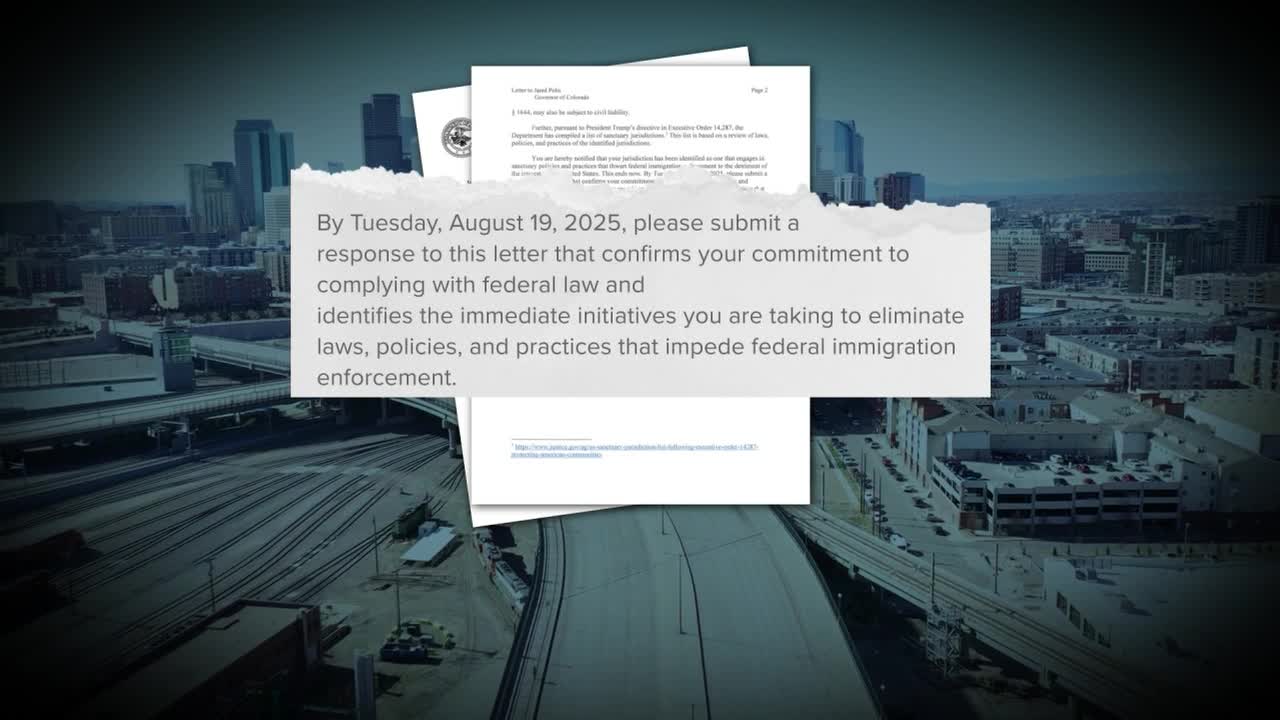DENVER — Gov. Jared Polis defended state laws limiting cooperation with federal immigration enforcement as he defied calls by the Trump administration to eliminate such laws or face legal consequences.
Earlier this month, U.S. Attorney General Pam Bondi threatened Gov. Polis with legal action and the pulling of federal funds if he failed to respond by Aug. 19 with initiatives he was taking to rescind those laws.
In response, Polis rejected the idea that Colorado was a “sanctuary state,” saying he was “frustrated by the administration's mislabeling… despite conclusive evidence to the contrary,” and asked Bondi to remove the state from a list curated by the U.S. Department of Justice (DOJ) describing it as such.
“If ‘so-called sanctuary jurisdiction policies’ have ‘undermined this necessary cooperation and obstructed federal immigration enforcement,’ elsewhere in the country we cannot say, but that has not happened and is not happening here,” the response from Gov. Polis reads. “Thankfully, Colorado is not a sanctuary state.”
Polis then defended the legality of Colorado law, saying the state “fully cooperates with federal authorities in identifying, apprehending, and prosecuting criminals – regardless of immigration status,” and cited the recent signing of SB25-276 into law, which allows for state and local officials to share information with federal government to assist in criminal investigations or proceedings.
But the governor was also defiant in his response to Bondi as the government seeks to ramp up mass deportations — a key signature policy of the second Trump administration.
“Colorado, like many states, will not allow the federal government to commandeer our public safety resources, and our right to do so is protected by the Tenth Amendment of the Constitution,” the governor wrote, adding state laws require compliance with “valid federal laws.”
- Read the full response from Gov. Polis here or in the embed below.
The Tenth Amendment establishes the bounds of the federal government’s authority by balancing its vast power against state sovereignty.
That power has been challenged in court rulings over the past 30 years, which have repeatedly found that the federal government cannot compel states and local jurisdictions to carry out or enforce federal immigration policies. Other rulings have found that threatening states with federal funding cuts is likely unconstitutional, according to the National Immigration Forum.
That hasn’t stopped the DOJ from trying to get Colorado and other jurisdictions to eliminate its laws limiting cooperation with U.S. and Immigration Customs Enforcement (ICE) — with little success.
Late last month, a federal judge threw out a Trump administration lawsuit against Illinois and the City of Chicago to upend so-called “sanctuary policies” that interfered with Trump’s mass deportation plans, calling the suit an “end-run around the Tenth Amendment.”
And on Friday, a second federal judge ruled the Trump administration cannot deny federal funding to cities like Denver because of policies that limit cooperation with ICE, saying in his ruling the executive orders enacted by the Trump administration to do as such were an unconstitutional “coercive threat.”
In a statement, Polis spokeswoman Ally Sullivan decried the state’s labeling as a sanctuary state as well as “the lack of transparency from the federal administration on this and many other items,” while outlining the governor’s focus on improving public safety and apprehending dangerous criminals — whether they are in the country legally or not.
“The Governor encourages the federal administration – and Congress – to focus on actually securing the border, decreasing violent crime, increasing transparency, and passing real immigration reform,” she said.
What Colorado laws does the Trump administration take issue with?
Since taking full control of the state government in 2019, Colorado Democrats have passed several laws aimed at making life easier for undocumented immigrants.
In 2019, Polis signed HB19-1124, one of the most oft cited laws by Colorado Republicans unhappy with the state’s immigration policies. Officially known as the “Protect Colorado Residents From Federal Government Overreach Act,” the law prevents law enforcement officers from arresting or detaining someone on the basis of their immigration status or holding someone past their release from jail just so they can be immediately detained by immigration agents.
While it makes no mention about immigration enforcement, SB20-083 was signed into law just a year later. The law protects individuals from being arrested for civil infractions while they are inside a courthouse or while on their way to or from court proceedings.
In 2021, Gov. Polis then signed SB21-131 into law, which prohibits state employees from looking into a person’s immigration status and sharing that information with U.S. Immigration and Customs Enforcement (ICE), unless it’s to comply with a court-issued subpoena, warrant or order.
Two years later, Polis signed HB23-1100 into law, which further restricts state cooperation with immigration enforcement officials by prohibiting any state agency or local government from entering into agreements with private entities for the detention of in individuals in immigration detention facilities.
Earlier this year, Polis signed the latest measure expanding protections for immigrants without legal status. SB25-276 prohibits local government officials and employees from sharing personal identifying information about someone’s immigration status with ICE, and limits where immigration agents can go within a public child care facility, school, hospital or library without a warrant signed by a judge.
There is no strict definition for sanctuary policies or sanctuary cities, but the terms generally describe limited local cooperation with Immigration and Customs Enforcement.





Denver7 is committed to making a difference in our community by standing up for what's right, listening, lending a helping hand and following through on promises. See that work in action, in the videos above.




